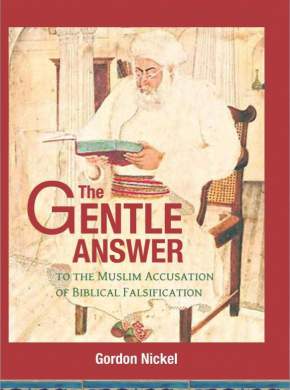
Being part of its launch in India (March 2015) by Centre for Islamic Studies at South Asia Institute of Advanced Christian Studies (SAIACS), Bangalore, while pursing my studies under Dr Gordon Nickel, I found this book to be an exceptional academic reference; and today it is an expedient tool in my ministry among Muslims in Northeastern states of India.
Dr Nickel, having completed his PhD under Andrew Rippin at the University of Calgary, is an expert on the Qur’an with a great familiarity of the written languages of Arabic, Hebrew and Greek.
The significant reason to read this book is that The Gentle Answer is a response to the Muslim book Izhar-ul-Haq: The Truth Revealed by M. Rahmatullah Kairanvi (1864) which attacked the authenticity of the Torah and the Gospel with an accusation that Jews and Christians had falsified the original text.
This book provides remarkable answers pointing to the Qur’an which actually speaks of the earliest scriptures with great respect. The author points out how the earliest Muslim commentators integrated the Bible in their exegesis of the Qur’an showing their respect for the Hebrew Scripture and the Gospel. However, Islamic sources do teach textual falsification in regard to one particular claim that Muhammad’s description is allegedly removed from a copy of the Torah and form an accusation towards Christians on textual falsification.
In answer to the allegation of corruption in transmission of the biblical text, Dr Nickel mentions the discovery of the Dead Sea Scrolls (1947) and presents the case that the Hebrew Scripture have been transmitted faithfully since the second century BC. Similarly, evidence of the manuscript for the New Testament documents, as discussed by the author, shows that it exceeds anything that Muslims can show for the Qur’an or for the subsequent biographies of the messenger of Islam. Therefore, it is an affirmation to the Christian readers that the accusation of textual falsification by Muslims cannot be conceivably true based on textual–critical grounds. Nevertheless, Dr Nickel targets both Christian and Muslim audience, questioning and presenting challenges to the Muslim reader as well as informing the Christian reader to reason what lies behind the Muslim accusation of biblical falsification.
The author, in his previous book Narratives of Tampering in the Earliest Commentaries on the Qur’an (Brill, 2010), states that neither the Qur’an nor early Muslim commentators teach about the concept of textual falsification of the previous scriptures (taḥrif al-nass), but instead teach that the previous scriptures had merely been misinterpreted by those who had received them (taḥrif al-mana). It is a conclusion based on the exegesis of the earliest Islamic commentaries on various “tampering” (taḥrif) texts by Muqatil ibn Sulayman (d. 767) and al-Tabari (839–923).
The Gentle Answer is a book that affirms the central truths of Christianity with a “gentle answer” inviting both Christian and Muslim scholars to mutually dialogue on the authenticity of the bible and the Qur’an.
Likewise, in the book The Gentle Answer, the author cites many earlier exegetes of the Qur’an that amenably write about the incompleteness of the Qur’an and the lack of unanimity concerning its interpretation. This shows that the scrutiny of the biblical transmission is avoided by the Muslims while presenting the reliability of the Qur’an.
Dr Nickel concludes The Gentle Answer with the most contended topic on Jesus. Various messianic prophecies in the Old Testament (particularly Isaiah 53, which is also used in the New Testament) are certain fulfilments of Jesus as the Messiah which holds the central Christian faith and belief (fulfilled in the person, life, death and resurrection of Jesus Christ). So, the significance of Jesus as the “Lamb of God” as portrayed in the Gospels is the biblical concept of atonement (which applies to the sacrificial death of Jesus on the cross for the sake of sinners).
Again, Muslims’ misunderstandings of Jesus as the “Son of God” in the Qur’an and Islamic commentaries are based on a physical sense (from my personal experience while interacting with Muslims). Dr Nickel points to the denial of Jesus as the Son of God in the Qur’an with the historical evidence of seventh century. He says that the third caliph in the Umayyad dynasty Abd al-Malik built the Dome of the Rock on the Temple Mount in Jerusalem in 691 AD and inscribed the 112th sura of the Qur’an: “He is Allah, One, Allah the samad, he does not beget nor was he begotten, and there is none like him” (according to Muslim interpretations, samad means “self-sufficient” which shows that Allah is not in need of anything). The Dome of Rock even today holds “the denial of the divine Sonship of Jesus” as one of the major themes of the Dome’s inscriptions.
In response, Dr Nickel mentions that the Qur’an acknowledged the prophet Isaiah saying, John the Baptist (Yahya) would come to “confirm a word from Allah” (Q. 3:39) and it was testified during Jesus’ baptism. The Apostle John in the New Testament records, “I saw the Spirit come down from heaven as a dove and remain on him…I have seen and testify that this is the Son of God” (Jn 1:32, 34). When Nathanael met Jesus, he (Nathanael) “confessed Jesus as the Son of God” (Jn 1:49–50) and Martha (sister of Lazarus) “responded to Jesus’ claims with the words ‘I believe that you are the Messiah, the Son of God, who was to come into the world’” (Jn 11:27). Jesus Himself accepted the title ‘Son of God’ and explained by saying, “I and the Father are one” (Jn 10:30). In addition, the prophecy in Deuteronomy 18 about a prophet who is to come which the New Testament applies to Jesus, Muslims often misinterpret this as a prophecy of their messenger. So, Dr Nickel affirms that the Holy Spirit was sent by Jesus to aid His disciples but often Muslims claim it for their messenger again.
Thus, The Gentle Answer is a book that affirms the central truths of Christianity with a “gentle answer” inviting both Christian and Muslim scholars to mutually dialogue on the authenticity of the Bible and the Qur’an. I highly recommend Indian scholars, leaders and those working among Muslims to read this book for an in-depth interaction of the most-debated issues surrounding Christian–Muslims encounters.





